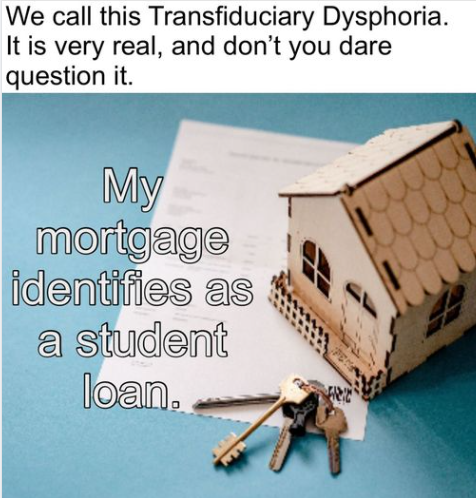Student loans
-
"public service" sounds so much better than "government job"
My dad worked for the government pretty much his whole working life, but I don't think he saw it as 'service'. Terrible salary, great pension.
@Doctor-Phibes said in Student loans:
"public service" sounds so much better than "government job"
My dad worked for the government pretty much his whole working life, but I don't think he saw it as 'service'. Terrible salary, great pension.
Middlin' salary, good pension.
-
@Larry said in Student loans:
I paid my own way through college. I worked. When i graduated I owed nothing.
I had scholarships, grants, and fellowships pay for all my degrees (except for about $8K in student loans for my undergrad). I got lucky, and doubt I could do it again...
-
@Larry said in Student loans:
I paid my own way through college. I worked. When i graduated I owed nothing.
I did that for undergrad in Canada (well partially, I had a few thousand in loans). Unless you get a full scholarship - that seems impossible for many schools in the U.S. now (The sticker price is $200K for many undergrad and professional degrees)
-
My parents paid for three state college 4 year degrees. They were comfortable but not well off. No way the equivalent position could do that today unless they were crazy savers most of their lives.
@jon-nyc said in Student loans:
My parents paid for three state college 4 year degrees. They were comfortable but not well off. No way the equivalent position could do that today unless they were crazy savers most of their lives.
Yeah but the value of the education is so much greater these days. You get what you pay for.
-
White House Plan: $10,000 per borrower
White House officials are currently planning to cancel $10,000 in student debt per borrower, after months of internal deliberations over how to structure loan forgiveness for tens of millions of Americans, three people with knowledge of the matter said.
President Biden had hoped to make the announcement as soon as this weekend at the University of Delaware commencement, the people said, but that timing has changed after the massacre Tuesday in Texas.
The White House’s latest plans called for limiting debt forgiveness to Americans who earned less than $150,000 in the previous year, or less than $300,000 for married couples filing jointly, two of the people said. It was unclear whether the administration will simultaneously require interest and payments to resume at the end of August, when the current pause is scheduled to lapse.Wiping out $10,000 of debt per borrower could cost roughly $230 billion, according to estimates by the Committee for a Responsible Federal Budget, a nonpartisan think tank. However, restarting payments for borrowers, which have been on hold since March 2020, would bring additional money into federal coffers. The think tank said in March that pausing payments had cost the federal government $100 billion and would run around $50 billion per year to maintain. The Washington Post had previously reported that the administration was considering making only undergraduate debt eligible for forgiveness.
-
Wow, what an incredible waste of our taxes to score political points. This will have minimal impact on student debt, the rate of higher education costs, etc. What about those who just paid off their loans? What about those who might have a parent who makes $155,000 but also has 4 kids in college? So many questions...
If anything, a program could be implemented that forgives loans (or repays paid-off loans) for those who spend XX years in certain professions, like they do with teachers I think? Some program that really gets to the heart of the matter, not just mass-printed checks to those who qualify, regardless of circumstance, major, performance, etc.
-
The worst part is they require nothing from the universities. They’ll just do it again.
At least they capped it at 10.
-
They need to compete better on price and value rather than status and amenities.
The best way to do that would be to not have student loans be excluded from bankruptcy and to not have the federal backstop.
@jon-nyc said in Student loans:
They need to compete better on price and value rather than status and amenities.
The best way to do that would be to not have student loans be excluded from bankruptcy and to not have the federal backstop.
I agree with the first statement and the parts from the second statement about allowing student loans to be discharged through bankruptcy and not have federal backstop for student loans … but I don’t quite see how these two parts from the second statement are good ways to achieve the first statement. What am I missing?
-
Money would be harder to come by putting general price pressure on the university system. Lenders would want to know someone is not putting themselves in an untenable spot so there would be some consideration of value of the degree and likelihood of completing it.

